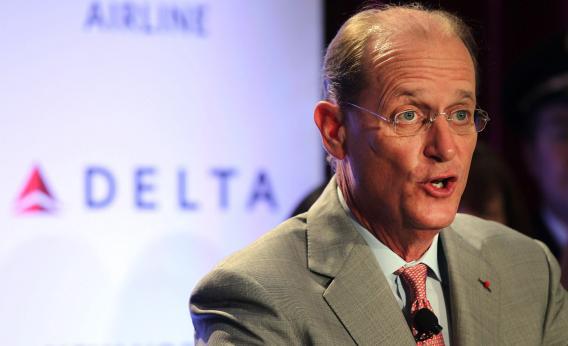The latest business innovation from the perennially struggling airline industry is that this morning Delta announced that it’s going to purchase a recently idled oil refinery near Philadelphia. All the press coverage of this I’ve seen echoes the company’s official line that this is a smart way to deal with the rising cost of jet fuel. But if that’s true, it seems like a damning indictment of an American financial sector that for all its talk of innovation is supposed to be in the business of creating more elegant solutions to these kind of problems.
Airlines buy jet fuel from refineries, who manufacture jet fuel after purchasing crude oil. So airlines lose out if either the refineries’ spread goes up or if the price of crude oil goes up. If you merge an airline with an oil refinery, than the merged entity still loses out if the price of crude goes up. What you’ve done is created a merged entity that’s less exposed than an independent airline would be to an increase in refineries’ profit margins. On the other hand, the merged entity is also less exposed than an independent airline would be to the benefits of an decrease in refineries’ profit margins. And the price—$100 million to buy the refinery and $150 million in new investments to improve its infrastructure—is a rather expensive way of switching one risk for another. The state of Pennsylvania is kicking in an additional $30 million to save the jobs at the refinery, which sweetens the pot, but presumably a similar amount of subsidity would have been available for anyone willing to keep operating the plant. There’s no special reason there to combine it with an airline. In fact, what Delta is trying to achieve here is supposed to be what financial markets are for. The airline wants to tweak its risk exposure and is willing to pay hundreds of millions of dollars for the privilege. They should be able to spend that money hiring some clever folks to engineer the right set of market bets to achieve the level of risk exposure that Delta wants. That way you achieve the hedging without taking on the practical diffculty of a company with no fuel manufacturing experience entering a highly technical new line of business.
But in a phone briefing with reporters, Delta CEO Richard Anderson claimed that “What we’re tackling here today is the jet crack spread, which you cannot hedge in the marketplace effectively.”
Now it’s possible Anderson is simply mistaken about this somehow, though if that’s the case whoever it was from JP Morgan who advised Delta on the deal really should have piped up. But if we take him at his word, it looks like a very clear example of a case where finance has the theoretical capacity to provide value to the real economy and then is simply failing to do so. For a really big company like Delta, going out and buying a manufacturing facility can work as a second option but lots of individuals and businesses don’t have that kind of scale. Meanwhile, I do think it’s interesting that Pennsylvania’s very conservative governor seems to suddenly have no problem with public sector job creation spending as long as it’s possible to engineer the stimulus as a form of financial assistance to an oil refinery.
